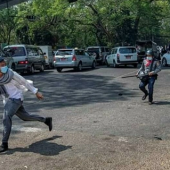Global Impunity Index ranks 7 Asian nations as "worst" in pursuing journalists' murderers

The Global Impunity Index by the Committee to Protect Journalists (CPJ's) said that seven Asian countries—Syria, Afghanistan, Iraq, the Philippines, Myanmar, Pakistan, and India—were the worst at putting killers of journalists on trial in a report released on November 1.
The report said that the vast majority of the murderers of journalists continue to get away with their acts. In nearly 80% of the 263 incidents in the past 10 years, in which journalists were killed because of their jobs, the perpetrators were not punished.
The Philippines and Myanmar are the two Southeast Asian nations ranked seventh and eighth, respectively, among the eleven countries deemed "worst" in pursuing killers of journalists.
For the third consecutive year, the Philippines retained its position as the seventh-worst nation for prosecuting journalists' murderers.
The legendary broadcaster Percival "Percy Lapid" Mabasa was recently slain, according to the CPJ.
"The election of President Ferdinand Marcos Jr. brought hope of a shift away from outgoing President Rodrigo Duterte's campaign of intimidation and harassment of the press," the CPJ said.
"However, the killings of two radio commentators—Percival Mabasa, a vocal critic of Duterte and Marcos Jr., and Renato Blanco, who reported on local politics and corruption—since Marcos Jr. took office in late June have raised fears that the culture of violence and impunity will continue," the article said.
Myanmar made its first appearance on the index for 2022. According to the CPJ's prison census, which was done on December 1, 2021, Myanmar is the eighth worst jailer of journalists in the world.
The report stated, "In the wake of the democracy-suspending coup in February 2021, Myanmar’s military junta has jailed dozens of journalists and used sweeping anti-state and false news laws to suppress independent reporting."
"It also has murdered at least three journalists, including two—Aye Kyaw and Soe Naing—who photographed protests against the regime and later were arrested and killed in custody," the report continued.

Syria, Afghanistan, and Iraq respectively are among the top five countries on the index, during the period spanning between September 1, 2012, to August 31, 2022.
"Each of these countries has been on CPJ's index more than once,” the report said, adding that “their history of conflict, political instability, and weak rule of law demonstrates how entrenched impunity is and how unlikely it is that authorities will ever spend money to ensure journalists receive justice.”
During the time of the study, the CPJ found that Syria, Afghanistan, and Iraq were each responsible for 16, 17, and 17 unsolved murders.
Pakistan and India were ranked tenth and eleventh, respectively, on the index. Since 2008, when CPJ started making the index, both of these countries have been on it every year. Between September 1, 2012, and August 31, 2022, there were nine unsolved murders in Pakistan and twenty unsolved murders in India.
“This demonstrates that violence and impunity against the press are still issues in many nations," said the report.
The Committee to Protect Journalists found that between September 1, 2012, and August 31, 2022, a total of 263 journalists were killed because of their jobs.
In 206 (78%) of these cases, CPJ documented complete impunity, which means that no one has been prosecuted for the crime.
CPJ is a New York-based independent, non-profit organization that promotes press freedom around the world and defends the right of journalists to report the news safely and without fear of punishment.
To maintain its independence, CPJ does not accept government grants or funding. All of its work is funded by contributions from individuals, organizations, and foundations. -Kasmir Nema.
Radio Veritas Asia (RVA), a media platform of the Catholic Church, aims to share Christ. RVA started in 1969 as a continental Catholic radio station to serve Asian countries in their respective local language, thus earning the tag “the Voice of Asian Christianity.” Responding to the emerging context, RVA embraced media platforms to connect with the global Asian audience via its 21 language websites and various social media platforms.














